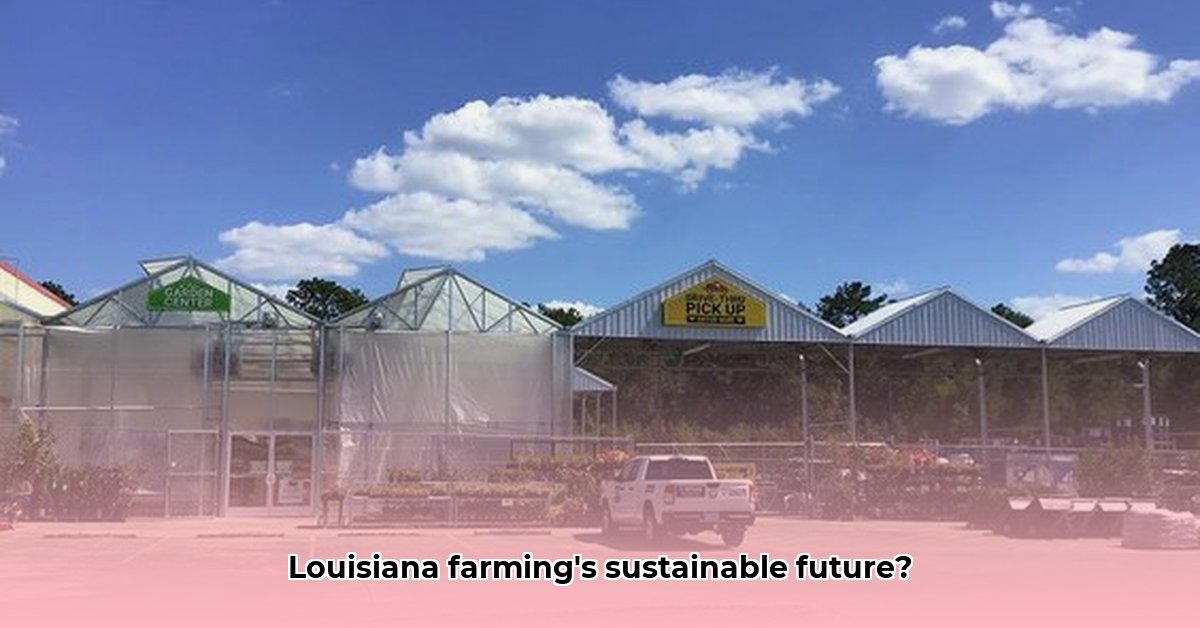
Assessing Tractor Supply's Contribution to Sustainable Agriculture in Louisiana
Tractor Supply Company (TSC) holds a prominent position in Louisiana's agricultural landscape, with numerous stores serving farmers and ranchers across the state. However, quantifying its contribution to sustainable farming practices remains challenging due to a lack of readily accessible, comprehensive data. This article analyzes the available information, highlights crucial data gaps, and proposes actionable recommendations to foster a more sustainable agricultural future in Louisiana. For example, see this Oakdale store page.
Mapping TSC's Louisiana Footprint: A Need for Transparency
While TSC's presence in Louisiana is undeniable, precise details regarding store locations, sizes, and product inventories are scarce. This lack of readily available information significantly hinders a comprehensive assessment of its impact on sustainable agriculture. A detailed map visualizing TSC store locations, perhaps color-coded by size or estimated sales volume (if such data were publicly accessible), would provide valuable insight into market penetration and potential areas needing further attention. This visual representation would be crucial in understanding the geographic distribution of TSC's influence. Currently, assessing TSC's footprint is akin to evaluating a forest by examining a single tree.
Unveiling TSC's Sustainable Product Mix: A Data Desert
A critical gap lies in the absence of detailed information on the specific products sold within Louisiana TSC stores. Without data on the sales volume of organic seeds, water-saving irrigation systems, environmentally friendly fertilizers, or locally sourced products, we can only speculate about TSC's commitment to sustainability. Knowing whether TSC prioritizes sustainable products is vital to understanding its contribution to the broader sustainable agriculture landscape in Louisiana. Access to a detailed product sales breakdown within each Louisiana store, categorized by sustainability, would significantly bolster our analysis.
Actionable Recommendations: A Collaborative Approach
Addressing this data deficit requires a collaborative effort among multiple stakeholders:
1. Tractor Supply Company (TSC): Prioritizing Transparency
- Short-Term (Within 1 Year): Publicly release a comprehensive inventory of products offered in each Louisiana store, clearly categorizing items that support sustainable farming practices. This inventory should be easily accessible online.
- Long-Term (3-5 Years): Publish an annual sustainability report specifically detailing Louisiana operations, including environmental metrics (carbon footprint, waste reduction), and community engagement initiatives. This report should follow established sustainability reporting frameworks for maximum transparency and comparability.
2. Louisiana Farmers: Active Feedback and Collaboration
- Immediate Action (Within 1 Year): Farmers should directly inform TSC about the availability and affordability of sustainable products, providing valuable feedback to enhance product offerings and support systems.
- Long-Term Collaboration (3-5 Years): Farmers should actively engage with TSC and government agencies to improve access to sustainable agricultural resources and promote the adoption of eco-friendly methods.
3. Louisiana State Government: Incentivizing Sustainable Practices
- Near-Term Action (Within 1 Year): Conduct a thorough analysis of TSC’s current role in Louisiana agriculture, identifying opportunities to better support sustainable practices through policy and incentives.
- Long-Term Policy (3-5 Years): Implement financial incentives (tax breaks, grants) to encourage retailers like TSC to prioritize sustainable products and support farmers’ adoption of eco-friendly techniques.
4. Environmental NGOs: Independent Assessments and Advocacy
- Near-Term Research (Within 1 Year): Conduct independent assessments of TSC’s environmental impact in Louisiana, providing an objective evaluation of its practices. These assessments should utilize standardized methodologies to ensure consistency and reliability.
- Long-Term Partnerships (3-5 Years): Partner with TSC and other stakeholders to promote best practices and advocate for policies supporting sustainable agriculture.
Conclusion: A Call for Collaboration and Data-Driven Decision Making
The question of Tractor Supply’s impact on Louisiana’s sustainable agriculture remains open. The current lack of comprehensive data hinders a conclusive assessment. However, through increased transparency, enhanced data collection, and strengthened collaboration among stakeholders, we can build a clearer picture and work towards a more environmentally conscious and economically viable agricultural future for Louisiana. This collective effort is crucial for the long-term health and prosperity of Louisiana's farming communities. Further research, utilizing robust methodologies and involving various perspectives, is essential to inform effective policies and practices.